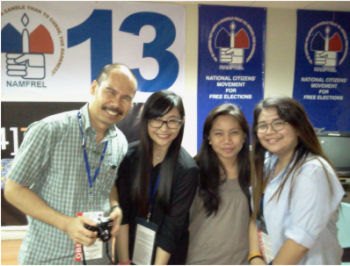| |
.. |
|
On Being a First-Time Voter
|
|
from
NAMFREL Election Monitor Vol.3, No.2 |
by Mai Arcano, BA Political Economy,
University of Asia and the Pacific (UA&P)
NAMFREL Volunteer |
|
. |
A few days before the event, I made sure that my
registration is valid and that I am eligible to vote for this year’s
elections. I also made other preparations such as searching for my precinct
number, listening to senatorial
debates, researching on candidate profiles, and a speck about knowing the voting
procedure.
On the day of the elections, I woke up around 6:30am to ensure that I would be
one of the first people in line. I
brought my driver’s license as my valid ID, a hand fan, tissue, and my phone to
keep me entertained just in case
the procedure starts to eat up my patience. In addition, I also wore clothes
that were loose and comfortable.
As I was approaching the voting precinct, there was a group of people who were
holding some pieces of paper,
eagerly giving them away to the people who passed by as if they were
distributors of condominium flyers that we
often see in malls. As conspicuous as it is, it saddened and angered me greatly
to see this. For one, this only proves how some political candidates would go
overboard just to gather votes. I would not call this “determination” or
“enthusiasm”; rather, I would refer to it as being greedy and incompetent. It
also gave me a reason not to vote for these people, seeing how recalcitrant they
are as citizens. Another thing that brought me dismay is the sight of how people
could so easily trade their votes in exchange for financial supplication and/or
empty promises. Contemplating about it, however, I understand that they are not
to be entirely blamed for their actions given their situation. Nevertheless, I
would say that they are still accountable to themselves and to authorities as
well.
When I reached the polling precinct, the people were just all over the place.
There was a small tent in front of the precinct entrance where people apparently
searched for their precinct number. I almost joined the line thinking that it
could be the first step for voting. Thankfully, I saved some time by asking the
person in front of me regarding the purpose of the line. If only there was a
sign or a guide to assist me and the other voters.
Inside the precinct, I saw several lines and lists of names. I barely knew where
to look for my name and where exactly to line up. It was nice of the people in
line to ask me what my precinct number is and to direct me to my line. Again, if
only there were signs or assigned volunteers who could have guided me. |
|
|
After a few minutes of
standing and sweating in
line, along with a few attempts of co-voters to
convince me to vote for their supported candidates,
I finally got a hold of my ballot. I was suddenly
disappointed for another minute, seeing how the voters were seated in a
round table composed of about four to
six members with their unsecured ballots. Some might consider it an
insignificant concern, but I do believe in the
secrecy of the ballot. Even until I inserted the ballot in the PCOS
machine, I used the folder provided to ensure
that people could not see my votes. My ballot was rejected by the
machine in my first attempt but it later
accepted and counted my vote when I changed the side that I inserted.
Basically, the whole procedure took me about thirty minutes. Personally,
I would say that it was not that
traumatizing for a first-time voter but further improvements could
definitely be made in order to make the process
more efficient. |
.... |
 |
| Mai (second from
left) with other NAMFREL volunteers at the 2013 national
operations center |
|
|
Thereafter casting my vote, I headed to the NAMFREL headquarters to
“guard my vote”. I have never been this involved in the elections and it
surely is an unforgettable first-time experience that I would always be
eager to
share with other people.
Overall, I would still encourage the youth to register and vote no
matter how much inconvenience this may cause
them. Although as cliché as it may sound, I still believe that “every
vote counts” and that it is important to “make
your vote count”. To the elected officials and the potential candidates,
I speak on behalf of the youth with the
hope that you would give importance to the sanctity and security of the
elections. In the recent SONA of the
President, he mentioned that the May 2013 elections have been “peaceful
and orderly” particularly in Mindanao.
However, my experience of tabulating incident reports at NAMFREL would
say otherwise. It is apparent to us
that the Philippines and the system in this country is a work in
progress, but we do hope that these concerns
regarding the elections would really be given attention to. |
|
. |
|
|
|
|
| |
.
.
. |
|
| |
| |
|
|

